
Maharshi Dayanand Saraswati was an Indian philosopher, social leader and founder of the Arya Samaj, a reform movement of the Vedic dharma. He was the first to give the call for Swaraj as "India for Indians" in 1876, a call later taken up by Lokmanya Tilak. Denouncing the idolatry and ritualistic worship, he worked towards reviving Vedic ideologies. Subsequently, the philosopher and President of India, S. Radhakrishnan called him one of the "makers of Modern India", as did Sri Aurobindo.
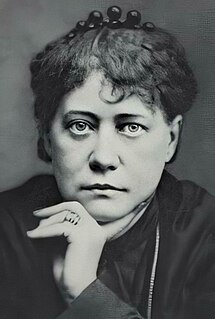
Helena Petrovna Blavatsky was a Russian author who co-founded the Theosophical Society in 1875. She gained an international following as the leading theoretician of Theosophy.
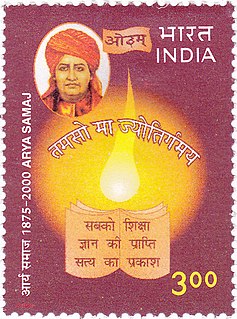
Arya Samaj is a monotheistic Indian Hindu reform movement that promotes values and practices based on the belief in the infallible authority of the Vedas. The samaj was founded by the sannyasi (ascetic) Dayanand Saraswati on 10 April 1875.
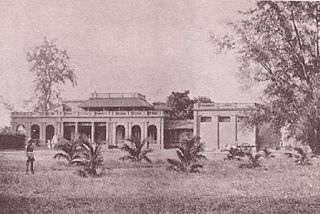
The Theosophy Society was founded by Helena Petrovna Blavatsky and others in 1875. The designation 'Adyar' is sometimes added to the name to make it clear that this is the Theosophical Society headquartered there, after the American section and some other lodges separated from it in 1895, under William Quan Judge. In 1882, its headquarters moved with Blavatsky and president Henry Steel Olcott from New York to Adyar, an area of Chennai, India.

The Theosophical Society, founded in 1875, is a worldwide body with the aim to advance the ideas of Theosophy in continuation of previous Theosophists, especially the Greek and Alexandrian Neo-Platonic philosophers dating back to 3rd century CE. It also encompasses wider religious philosophies like Vedānta, Mahāyāna Buddhism, Qabbalah, and Sufism. The Theosophical Society functions as a bridge between East and West, emphasizing the commonality of human culture.

The Theosophical Society in America (TSA) is a member-based nonprofit organization dedicated to the teaching of Theosophy and affiliated with the international Theosophical Society based in Adyar, Chennai, India. The name "Theosophical Society in America" was legally adopted by the American Theosophical Society in 1934. Previously, other organizations had used the same name during the years 1895–98 and 1898–1908.

Shyamji Krishna Varma was an Indian revolutionary fighter, an Indian patriot, lawyer and journalist who founded the Indian Home Rule Society, India House and The Indian Sociologist in London. A graduate of Balliol College, Krishna Varma was a noted scholar in Sanskrit and other Indian languages. He pursued a brief legal career in India and served as the Divan of a number of Indian princely states in India. He had, however, differences with Crown authority, was dismissed following a supposed conspiracy of British colonial officials at Junagadh and chose to return to England. An admirer of Dayanand Saraswati's approach of cultural nationalism, and of Herbert Spencer, Krishna Varma believed in Spencer's dictum: "Resistance to aggression is not simply justified, but imperative".

Theosophical teachings have borrowed some concepts and terms from Buddhism. Some theosophists like Helena Blavatsky, Helena Roerich and Henry Steel Olcott also became Buddhists. Henry Steel Olcott helped shape the design of the Buddhist flag. Tibetan Buddhism was popularised in the West at first mainly by Theosophists including Evans-Wentz and Alexandra David-Neel.

Neo-Theosophy is a term, originally derogatory, used by the followers of Helena Blavatsky to denominate the system of Theosophical ideas expounded by Annie Besant and Charles Webster Leadbeater following the death of Madame Blavatsky in 1891. This material differed in major respects from Blavatsky's original presentation, but it is accepted as genuinely Theosophical by many Theosophists around the world.
The Blavatsky Lodge was an English Theosophical Society. The complete name is The Blavatsky Lodge of the Theosophical Society.

The Coulomb Affair was a conflict between Emma and Alexis Coulomb, on one side, and Helena Blavatsky and the Theosophical Society, on the other.
The London Lodge was an English lodge of the Theosophical Society. Until the 1910s, the lodge was an important part of the theosophical movement.

Satyarth Prakash is an 1875 book written originally in Hindi by Maharshi Dayanand Saraswati, an influential religious and social reformer and the founder of Arya Samaj. It is considered one of his major scholarly works. The book was subsequently revised by Swami Dayanand Saraswati in 1882 and has now been translated into more than 20 languages including Sanskrit and several foreign languages like English, French, German, Swahili, Arabic and Chinese. The major portion of the book is dedicated to laying down the reformist advocacy of Swami Dayanand with the last three chapters making a case for comparative study of different religious faiths.

Swami Shraddhanand, also known as Mahatma Munshi Ram Vij, was an Indian Independence activist and an Arya Samaj sannyasi who propagated the teachings of Dayananda Saraswati. This included the establishment of educational institutions, like the Gurukul Kangri University, and played a key role on the Sangathan and the Shuddhi (purification), a Hindu reform movement in the 1920s.
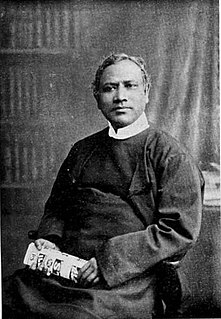
Sris Chandra Basu or Srish Chandra Vasu was an Indian Sanskrit scholar, judge, writer and translator of numerous works. He translated major yoga texts such as the Yogaśāstra, the Gheranda Samhita, and the Siva Samhita into English, several through his own publishing setup called the Panini office in Allahabad.
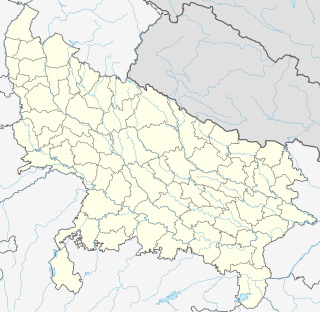
Chhalesar is a village in the block and nagar panchayat of Jawan Sikandarpur, Aligarh district in Northern India. It is also known for being the location of the fourth Vedic school ("gurukul") founded in 1870 by the Arya Samaj reform movement. Swami Dayanand also visited here with Thakur Bopal Singh and Thakur Manna Singh.
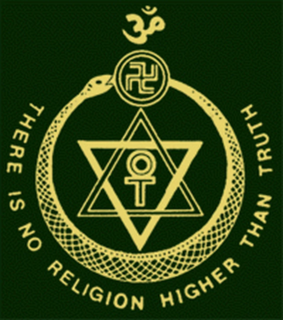
Theosophy is a religion established in the United States during the late 19th century. It was founded primarily by the Russian immigrant Helena Blavatsky and draws its teachings predominantly from Blavatsky's writings. Categorized by scholars of religion as both a new religious movement and as part of the occultist stream of Western esotericism, it draws upon both older European philosophies such as Neoplatonism and Asian religions such as Hinduism and Buddhism.

Mohini Mohun Chatterji was a Bengali attorney and scholar who belonged to a prominent family that for several generations had mediated between Hindu religious traditions and Christianity. He joined the Theosophical Society in 1882 and became Assistant Secretary of the Bengal branch. Later that year, he claimed he became a "chela" in probation of the Mahātmā Koot Hoomi, and saw apparitions of Mahatmas on five or six occasions. According to Theosophists, he eventually failed as a chela, and resigned from the Theosophical Society in 1887, after only five years of membership.

"What Are The Theosophists?" is an editorial published in October 1879 in the theosophical magazine The Theosophist. It was compiled by Helena Blavatsky and it was included the 2nd volume of the Blavatsky Collected Writings.

Hinduism is regarded by modern Theosophy as one of the main sources of "esoteric wisdom" of the East. The Theosophical Society was created in a hope that Asian philosophical-religious ideas "could be integrated into a grand religious synthesis." Prof. Antoine Faivre wrote that "by its content and its inspiration" the Theosophical Society is greatly dependent on Eastern traditions, "especially Hindu; in this, it well reflects the cultural climate in which it was born." A Russian Indologist Alexander Senkevich noted that the concept of Helena Blavatsky's Theosophy was based on Hinduism. According to Encyclopedia of Hinduism, "Theosophy is basically a Western esoteric teaching, but it resonated with Hinduism at a variety of points."














